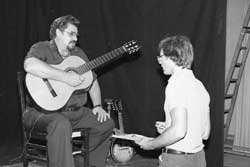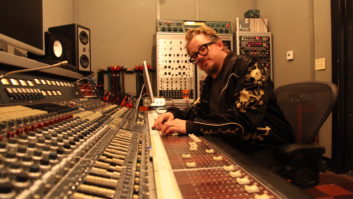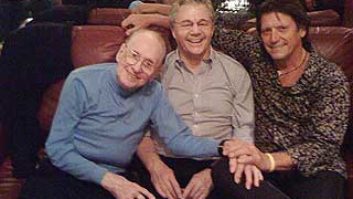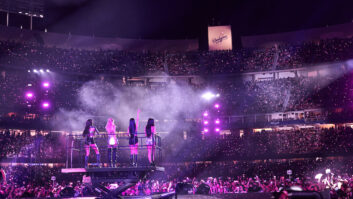
[Editor’s note: Jon Leonoudakis is one of the producers of the documentary film The Wrecking Crew, featured in the November issue of Mix. He shares this never-before-published 1985 interview with the late Wrecking Crew great, Tommy Tedesco.]
Tommy Tedesco (left) with Jon Leonoudakis
“C’mon back and meet Tom,” said my pal, Denny.
Instant butterflies in my stomach. I was about to meet the pope of guitar players. Many big-name composers, players and musicians nearly genuflected just at the mention of his name. And I, a professed guitar/music geek in his early 20s, was about to get an audience.
Drilling down deep into the musician sub-culture was passion of mine since I saw the names of studio musicians showing up on the liner notes of records in the ’70s. One day I read an article titled “Blindfold Test” in Downbeat, a jazz magazine, where a leading jazz artist is played cuts from another artist, not told who it is, and asked to comment on it. The article featured guitarist John Abercrombie, and the first track played was from one of Tommy Tedesco’s solo albums, “When Do We Start?”, a song entitled, “Denny T’s Mantra.” Abercrombie seemed to dig the track, stating the technique was pretty impressive. I went out and bought the record and was amazed at the music and guitar playing on the album. I’d also seen him on TV on Martin Mull’s classic “Fernwood 2 Nite” and “America 2 Nite” shows as the guitarist “Tommy Marinucci” of the white-hot studio band.
I was ushered into a back room at the Tedesco home in the San Fernando Valley. It was dark with wood paneling. There sat Tommy, the guitar giant, with nothing on but a pair of boxer shorts straining under his impressive 300-pound girth. His visage was intimidating: his olive skin blended seamlessly with his dark hair and Van Dyke beard. His presence was like some sort of Guitar Buddha. I felt a little like The scarecrow in “The Wizard of Oz” when the Wizard bellows, “Come forward, scarecrow!” Tedesco didn’t look happy, and he jelly-legged me with just one look.
That was my introduction to Tommy almost 30 years ago. I’d met his son, Denny, at Loyola Marymount Unversity, where we were both in the film school, and Denny suggested we work together to make a documentary about his father’s legendary career as a guitarist. For a lot of people who met Tommy for the first time, the first impression, that he looks kind of mean, was all wrong. He turned out to be a regular guy that loved life, his friends, and was deeply passionate about all things guitar. In many ways, he was like a big kid. Except this big kid was one of the world’s greatest musicians. He wasn’t without his flaws: He liked to gamble, ate too much, was a smoker, and had his share of phobias. He could also be hard on those who crossed the line, like producers who disrespected or tried to take advantage of musicians.
I was lucky enough to work with and know Tommy for about 15 years. The half-hour documentary Denny and I produced in the early 1980s was aired on PBS in Los Angeles in 1986 and featured interviews with Frank Zappa, Steve Lukather of Toto, and composers Bill Conti, Henry Mancini, and Frank DeVol (the latter of whom portrayed “Happy Kyne” on “Fernwood 2 Nite” and “America 2 Nite”). Then, in 1987, Denny and I produced a rarity: a jazz music video for a cut on Tommy’s “Hollywood Gypsy” record entitled, “Impressions of Hollywood Boulevard.” Then, in the mid-90s, Denny learned Tommy had terminal cancer. All the smoking from Tommy’s earlier days had planted the seed, and, even though he’d kicked the habit in 1980, his fate was sealed. Denny wanted to make a film about his father and his extended family and friends, The Wrecking Crew, and that’s how the documentary film got started. 12 years later, it’s making the rounds at film festivals all over the world and getting high praise from audiences and reviewers.
As part of my research for The Wrecking Crew, I came across an audiotaped interview I’d done with Tommy in 1985. I’d been very familiar with many of his stories from previous printed interviews in magazines like Guitar Player. I wanted this interview to uncover some new information, and it’s never been published, until now.
I went to Tommy’s home in Northridge, CA, and found him rehearsing with upright bassist John Leitham (now known as Jennifer Leitham) for an album date for one of Tommy’s solo records. During a break in the action, we had a chance to talk.
Being such a diverse guitarist, does it cause a problem being a musical chameleon and retaining your own stylistic and artistic identity?
No, because my artistic identity is all these things. When I pick up a guitar, I am all these things. I might be playing live, it might be a jazz date, but you’re gonna hear some Spanish influences in there, maybe some fake oriental experiences, all these things I’ve picked up, that’s part of me.
But what about when you’re inside the studio, does that stay the same?
No, when I’m inside the studio, I turn a switch. I am whatever they want me to be. If there’s a part that commands a Greek bouzouki player, I turn myself into that bouzouki player.
But what is it about your style as an artist that you bring to all those different parts?
I feel what I bring in is warmth. I bring warmth on all these parts. If I’m playing pretty Spanish stuff on guitar, I’m bringing the full warmth in. If I’m playing Greek, I’m bringing in the warmth of the Greek player. I’m bringng all these various things besides being able to play. Recently we did this picture, Indiana Jones and The Temple of Doom (1984), and for one part Johnny Williams did the score, and there was a scene where people are sitting there at a banquet of ants and weird things, and they asked me to play some sitar stuff. Well, I have an electric sitar, and I looked at the movie and tried to get the feeling of an Indian sitar player, playing while people are having a feast. And I did certain things that were kind of authentic from what I’ve heard in Indian music, and then I put in my own thing.
So this was a part that wasn’t written out? They just said, “Tom, run with it”?
Yeah. That’s kind of the one thing I do, because it saves them a lot of effort.
What was the toughest session you’ve ever had?
I would have to say I’ve had many tough dates for different reasons. Like I did a John Williams date years ago on a movie called “Conrack”. It was extremely tough because it featured me all over the place. I was very much alone. All those parts were written out.
What was the strangest or weirdest date?
Felix Slatkin… hottest violin player in LA. He had albums out featuring a string section. I’ll never forget, he died suddenly, the before the first date. (February 8, 1963, at age 47, of a heart attack). We were booked to record; we assumed the dates were canceled, they called and told us to show up anyway, said he would’ve wanted it. So here’s this beautiful string section playing with tears flying out of everybody’s eyes. Thinking that this was done with him gone. It was kind of a tough date not to remember.
What was the most memorable, or rewarding?
Recently I did a picture called The River (1984) with John Williams, and I had a lot of solo work, and it was rewarding because John loved it and the director (Mark Rydell), he came up, he loved my work and loved my work for years, and his son, who was also a guitar player, was on the date, and knew all about me. The whole date was filled with rewards both financially and ego-wise. Many times you do things you think were pretty good, and it doesn’t go over as well. I got applause from all the musicians after I did my solo, and there’s nothing like when your own peers acknowledge your work.
Which date was one you wish you’d never had to do?
I’ve never thought of it that way…even if I hated the date, it never meant anything to me.
What about one where things went wrong and there was a lot of tension?
Years ago, I did a date at for a picture at MGM …Dmitri Tiomkin was the leader and I had just got started in the business, and naturally it’s a world famous composer. And they had some (guitar) parts written. The only trouble was I had to rest for 2-3 minutes, and finally come in, and he was waving his hand conducting, and I didn’t know anything about that; I wasn’t used to a conductor. I did know that when he had his hand down and there was no music that I should’ve been playing. And he just started screaming at me, “Where are you, guitar! Why you no play?” I just started shaking. While I’m shaking, here’s 50-60 musicians turning around staring at you. Like this is the judge and jury. Fortunately, they didn’t know me at the time, I’d only been around a year or two. It was scary; my hands shook and they threw me out, it was over; saying, “Get out of here.” I’ve seen it happen to many musicians, where they can’t do the part, and they’re in trouble.
How do you come back from something like that?
When I have a bad experience, I turn it into a plus experience. I put the guitar in my hand and I start practicing. For instance, in 1953, I went to a jam session. I was playing jazz and I could tell the other musicians sure didn’t like what I did. I got the cold shoulder. So I went home and I practiced 10 hours a day. About 6-7 months later, I went back there and they didn’t remember me as the same man. When those guys heard me, they welcomed me with open arms, saying, “Gee, can you come every Monday?”
Which composer gives you the most trouble in terms of difficult parts to play—every time they call you, you know you’ve got a challenge ahead of you?
I’d have to say John Williams…he’s going to ask more of me. I just know when I walk into a John Williams date I’m not just gonna relax and have a cup of coffee. I know I have to check the music because it’s really going to be something, because John doesn’t play down any chair. And that works not just for me, but for everyone in the band. When you work for him, you’re gonna be working. Same for Jerry Goldsmith. When they call you, there’s a reason for you being there. And they’re gonna bring you right up to their high standards. A guy like Mancini, whenever I work for Henry Mancini, it’s on a certain situation. …he might want a mandolin or want a guitar from Puerto Rico…when you go there, you know he’s not going to be playing any “Yankee Doodle” stuff.
And the first time you see the music is when you walk through the door?
Yeah. Maybe about 2-3 times in my life have I seen it before. They’ve asked [to give it to me ahead of time]; generally, I hate that. I don’t like it because I don’t get a good enough feeling, the it’s just too tough that way. I’d rather just do it on the part. It’s like running a race—anybody that’s run in the Olympics, they’ve never run as fast as he did in the Olympics. When that red light goes on, whether its running a race or playing guitar whatever it is, all the adrenaline goes through the body. Some guys are at their best then, some say they’re at their worst. I’m at my best with the pressure.
How do you deal with the various personalities at a session, from your fellow musicians to the composer?
It’s a little different for me, dealing with people. Because if you’ve seen a picture of me somewhere, I’ve been described as a bearded wrestler, a bartender, a bouncer. People already figure I’m mean. No matter if it’s a leader or a producer up there, they aren’t sure how I’m gonna react. I just have a mean look, so I don’t have the problems other people have.
What I mean is, what is your own personal approach to dealing with people when it can get tense in a studio and time is money?
I don’t bat an eye. I just do the best I can. If I’m the wrong guy for the job, we’re all stuck. If I’m the right guy, we all benefit by it. I’ve had problems with a few different leaders that I didn’t like because they were not nice. I won’t take any abuse. I’ve walked out on a couple of dates.
Was that in the past, or recently?
Recently, a guy gave me a hard time, he was obnoxious. And you can be obnoxious to the world, that’s OK, but he singled me out, and he was obnoxious, and I went to him, “you’ve got your chance, I’ll stay and do whatever you want me to do, or you can get someone else. But don’t do that again.” As it turned out he was fine the rest of the day. I’ve never worked for him since, but that’s OK.
I have one code of ethics I use in the studio. When I’m up there, I’m considered one of the top guitar players in the country, and I want the same respect as he, if he’s considered one of the top leaders. I don’t have this feeling because I’m a guitar player and he’s a leader, that he’s a sergeant and I’m a private. We’re both sergeants, we’re both generals, we’re both privates.
What part does creativity play in conjunction with the written music?
It plays a big part. I don’t think of it as written music—it’s written notes –you make music out of notes that are written. That’s the creativity. They put these notes on a piece of paper, and I’ve heard guys play that, exactly like that, as notes. When I see a bunch of notes, I try and make music happen. That’s my creativity. No matter what I do, I try and make music happen.
So, you breathe life into it.
Yeah! That’s exactly it. I’m gonna have to use that one.
Have film directors have gone out of their way to acknowledge you’ve brought something to the session that was unexpected?
I’ve had that happen a few times with directors, but even actors who were heavily involved. People like Burt Reynolds have acknowledged me and my playing and my name. Clint Eastwood acknowledged my playing and my name. When I did this movie Table for Five (1983), Jon Voigt went out of his way to come out of the booth and talk to me. Recently I felt awful good when I did a picture called Rhinestone (1984); Dolly Parton went out of her way to come through the band and introduce herself to me. She said she’s been hearing about me for years, and felt good to finally meet me. Same thing happened when I did the Linda Ronstadt album (“What’s New”). She came up and introduced herself and said she’d heard my name all these years, and it was a pleasure working with me. So these things happen. They feel good!
What was it like working with Elvis? What kind of a man was he?
I wish I had had more confidence in what I was doing, in relationship to the leaders. I always knew I was a guitar player and I just played. I never paid attention to the leader or the artists. And here was Elvis, I’ll never forget doing things—he loved my work, he commented a few times. But it was just a job to me. I just knew his name was Elvis, and I said, “hey, I’m gonna work with Elvis tonight.”
We did the special (“Elvis’ 68 Comeback Special”), and recently they put it back on TV, and I heard all this nylon string classical type music coming, and I knew that was me, that I’d done on a tune called “Memories” with Elvis. And it cracked me up, and I said, “I’ve heard that tune; that’s me.” I’d forgotten all about it.
[In the early to mid-1980s, Tommy was asked to participate in the renegade symphony orchestra The New American Orchestra, which featured live performances of film scores and shows with special guests like Ray Charles, Stan Getz and Sarah Vaughan. The orchestra was filled with some of Los Angeles’ greatest studio players. I had attended one performance, where Tommy had to play guitar solos on some of Jerry Goldsmith’s score for the 1983 Gene Hackman film Under Fire. Up to that point, it was one of the rare live, public performances by Tommy.]
What was it like doing a solo live with a full symphony orchestra like The New American Orchestra behind you?
It was panic time all over again. Now, you’re on a concert stage, having to do a hard solo, and there ain’t no two cracks at it like the studio. You have some of the finest musicians in Hollywood, about a hundred of ’em, behind you, and in the audience are people like Henry Mancini, Lalo Schifrin, all the leaders. Watch out, Charlie, here it comes: Nitty Gritty Time. But, after you play the first couple of measures, the music comes back, the fear has left me.
Does practice ever become unnecessary, or does one get better with age if practice is continued?
Practice is a word I don’t use. I use “play.” If you play, you get better. I’m playing a lot, so I see myself getting better. There’s things I do now that I couldn’t have done three years ago. There are other things I never knew until now. At my age, I’m still progressing, and I see no let down at age 55.
Who do you listen to at home?
I’m a piano freak. I listen to people like Bill Evans and Chick Corea. I love piano harmony. I wish our guitars had that kind of harmony.
What’s your greatest dream?
To be doing exactly what I’m doing now, at a scale of 25% studio work, 25% live playing, 25% doing seminar work with kids, and the other 25%, hanging around and seeing how I did with the other 75%. That was bitch, I liked that one.
What does your 30 years of experience amount to?
First of all, I feel very fortunate. To be involved in music is a gift, God’s gift. Because I react differently—to be playing music for 30 years is unbelieveable. To have made a living, doing what I love to do.
Has anyone found the missing chord yet?
(without skipping a beat) No.
Does Italian food help your playing?
Yes, definitely. You can slide more. The more grease you have on your hands, the more it’ll help.
Tommy had a sharp, streetwise sense of humor, and enjoyed needling his family and friends. Underneath it all was a kind, sensitive man of immeasurable talent who went out of his way to help the younger guitar players and musicians. I recently ran into guitarist Mitch Holder at a Wrecking Crew screening in Los Angeles. And he told me that after the memorial service for Tommy in 1997, he got a call from another of LA’s top studio guitarists, Tim May. Tim asked Mitch, “Man, Tommy’s gone. Who are we going to go to now with our questions and stuff like that?” It was like a big brother or mentor had gone away. But, really, he hasn’t. He remains in the hearts and souls of those he touched. And now, we can appreciate Tommy, his life, and some of the incredible music he played in the 50s and 60s in the documentary film, The Wrecking Crew. It has been an honor and a pleasure to have known Tommy and be a part of his extended family for so many years, and to have a chance to participate in The Wrecking Crew, a significant cultural document that gives these incredible musicians a well-deserved taste of the limelight and public recognition.
Jon Leonoudakis is one of the producers of The Wrecking Crew.







